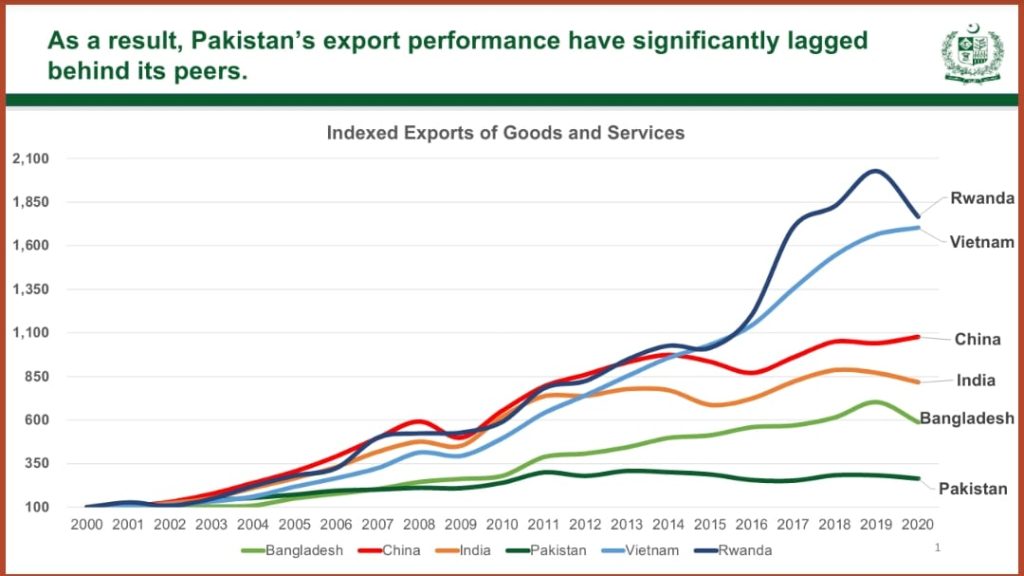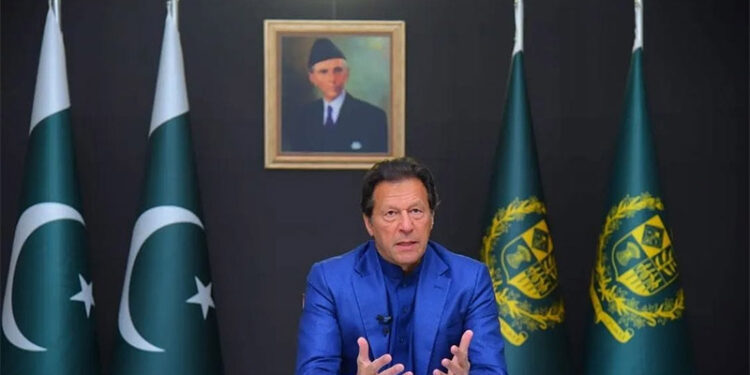Prime Minister Imran Khan, in a big initiative to protect the masses from the impact of global inflationary trends, on Monday unveiled a major relief package, including Rs 10 per litre reduction in petroleum prices, Rs 5 per unit cut in electricity tariff, and some other measures.
“The government has decided not to increase the prices of petrol and diesel as well as electricity tariff till the next budget,” Imran Khan said in his televised address to the nation.
The prime minister also announced to enhance the cash assistance, provided to eight million families under the government’s Ehsaas Programme, from the current Rs 12,000 to 14,000 to help the poor people.
He announced an internship program for the unemployed youth, under which those with a graduate degree, would be offered Rs 30,000 per month through a transparent and merit-based system.
The prime minister in his 40-minute speech spoke at length on multiple issues of national importance, including the foreign policy, amendment in the Prevention of Electronic Crimes Act (PECA) Ordinance, and his government’s challenges and achievements including on the economic front.
Imran Khan announced 2.6 million educational scholarships, saying Rs 38 billion would be allocated for the purpose.
He also announced various incentives for the promotion of the information technology (IT) sector, including 100% tax exemption for companies and freelancers, 100 % waiver on repatriation of capital and foreign exchange, and elimination of capital gains tax for startups.
The prime minister said the investment from the overseas Pakistanis, including through joint ventures, would enjoy tax-holiday for five years. No questions would be asked from those who would establish industries.
He further said that the government would spend Rs 460 billion for the provision of interest-free loans to the youth under the Kamyab Jawan Programme to start businesses, low-income groups to construct their own houses, and farmers.
The prime minister reminded that his government inherited a weak economy burdened with huge internal and external deficits, and foreign exchange reserves were only enough for three weeks of imports.
He said, “When we came out of a difficult time the world was hit by the coronavirus – the biggest crisis of the century.” The economies of countries like India and Europe suffered setbacks due to the pandemic.
Pakistan, he added, effectively dealt with the coronavirus and subsequent lockdowns, supply chain disruptions, and commodity prices hikes.
Talking about the economic malaise suffered by the country, he said Pakistan was using imported petroleum products, cooking oil, and pulses, besides generating electricity from imported fuel.
He recounted that the United States, Canada, the United Kingdom, and Turkey were hit by the highest inflation hikes in the last 30-40 years.
He mentioned that inflation during the past tenures of the Pakistan Peoples Party was more than 10 percent, and hovered around 10 percent while the Pakistan Muslim League-Nawaz was in government.

The international oil prices were the lowest during the last tenure of PML-N, he added.
Imran Khan said the international financial institutions acknowledged the economic success of Pakistan.
The Economist magazine, he said, noted that Pakistan was among the top three countries, which had effectively tackled the coronavirus. The World Bank, World Economic Forum, and World Health Organization also appreciated its efforts during the coronavirus pandemic, he observed.
Bill Gates appreciated Pakistan for its achievements in the health sector, he said, adding no polio case was reported in the last year.
He recalled that the World Bank ranked the Ehsaas program as one of the best programs in the world, while the British prime minister appreciated Pakistan’s endeavors to tackle the issue of climate change.
The prime minister mentioned that Pakistan’s currency value against the dollar decreased as the greenbacks were sent to Afghanistan.
He said Pakistan’s economy grew by 5.6 percent as verified by the World Bank. The remittances from overseas Pakistanis rose to $ 31 billion and foreign exchange reserves to $ 23.2 billion, while Pakistan recorded the highest level of exports. The exports of other countries continued increasing in the last 20 years while Pakistani exports did not increase much in the tenures of past
governments.

The tax collection enhanced to more than Rs 6,000 billion, rising by 31 percent, he added.
He said the country had good crops of wheat, rice, sugarcane and corn, and farmers earned Rs 1,100 billion while taking benefit of the support package given by the government and timely payments from the sugar mills.
While enumerating economic achievements of Pakistan, he said large scale manufacturing increased by 7.5 percent, and private sector companies earned Rs 930 billion in profits, besides getting credit of Rs 1,400 billion from the banks. Tractor sales rose by 20 percent, and those of trucks and buses by 81 percent, while the oil consumption increased by 15 percent.
Rs 1,500 billion flowed into the construction sector due to the housing sector package announced by the government, he said, adding the banks had already approved loans of Rs 150 billion for low-cost housing and Rs 50 billion had been disbursed.
Imran Khan said Pakistan still had low oil prices as compared to other countries.
He said Pakistan was building 10 water reservoirs to generate cheap electricity.
Despite the recommendation of the Oil and Gas Regulatory Authority (OGRA), he was not raising the price of petrol, he asserted.
He said every citizen would be given health insurance of Rs 1 million.
“My government is only thinking about providing relief to the people,” he said, adding the Bloomberg magazine and International Monetary Fund had stated that Pakistan was on the right economic path.
The prime minister said Pakistan joined the US-led war on terror after 9/11 and suffered 80,000 casualties, displacement of 3.5 million, and $150 billion economic loss, despite having nothing to do with the incident, though he had always advocated an independent foreign policy.
The United States despite getting Pakistan’s support, carried out around 400 drone attacks in the country, which, he termed, the “most shameful.”
For the sake of their legitimacy, Imran Khan said, the dictators easily fell prey to the superpowers usually. But ironically, only 10 drone attacks were made in Pervez Musharraf’s tenure against 400 during the governments of Asif Ali Zardari and Nawaz Sharif, who did not speak against the killings of innocent people.
The prime minister said the leaders having riches abroad and offshore accounts could never take decisions in the nation’s interest and advised the people against voting such leaders, who could never make independent decisions.
Highlighting his China and Russia visits, Imran Khan said Pakistan would import around 2 million tons of wheat, and gas from Russia. Moreover, the outcomes of the agreements with China regarding the second phase of CPEC (China Pakistan Economic Corridor) would come to the fore soon, he added.
Regarding the criticism over the Prevention of Electronic Crime Act (PECA) Ordinance, the prime minister explained that it was promulgated in 2016 and the incumbent government was just amending it to do away with the filth on social media, women harassment, and child pornography.
“We are just amending it. The leader, who doesn’t violate laws, will never be afraid of free media,” he said and added that currently, almost 70 percent of total news coverage was against the government.
He said around 94,000 cases related to women’s harassment, fake news, and pictures were pending with the FIA (Federal Investigation Agency) and of those, only 38 had been disposed of so far.
He said even a sitting prime minister and his family were not spared from fake news. He could not get justice even after three years in a defamation case.
Imran Khan said recently, a woman was fined by a United Kingdom court over defamation, and Communications Minister Murad Saeed was also considering registering a case there.
He said the media also alleged that the Shaukat Khanum Hospital’s funding was landing into the accounts of Pakistan Tehreek-e-Insaf without even getting the official version. The hospital was also going to file a case against Jang Group in the UK and the United States where it was registered as a charity, he added.
“It happens nowhere in the world. Here are the mafias blackmailing in name of the freedom of the press. They have different agendas. They are blackmailing and mudslinging against the government,” he commented.
Calling it essential for the country, he said the PECA had nothing to do with the freedom of the press. Instead, good journalists should be happy over the curb of fake news as it would enhance their credibility.
Referring to the fake news published by three leading national newspapers alleging the selection of Azad Jammu & Kashmir prime minister through some sort of necromancy, he said had it happened in the West, the owners would have to sell out their outlets to pay for the libel.













